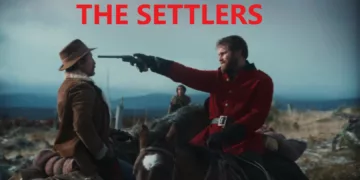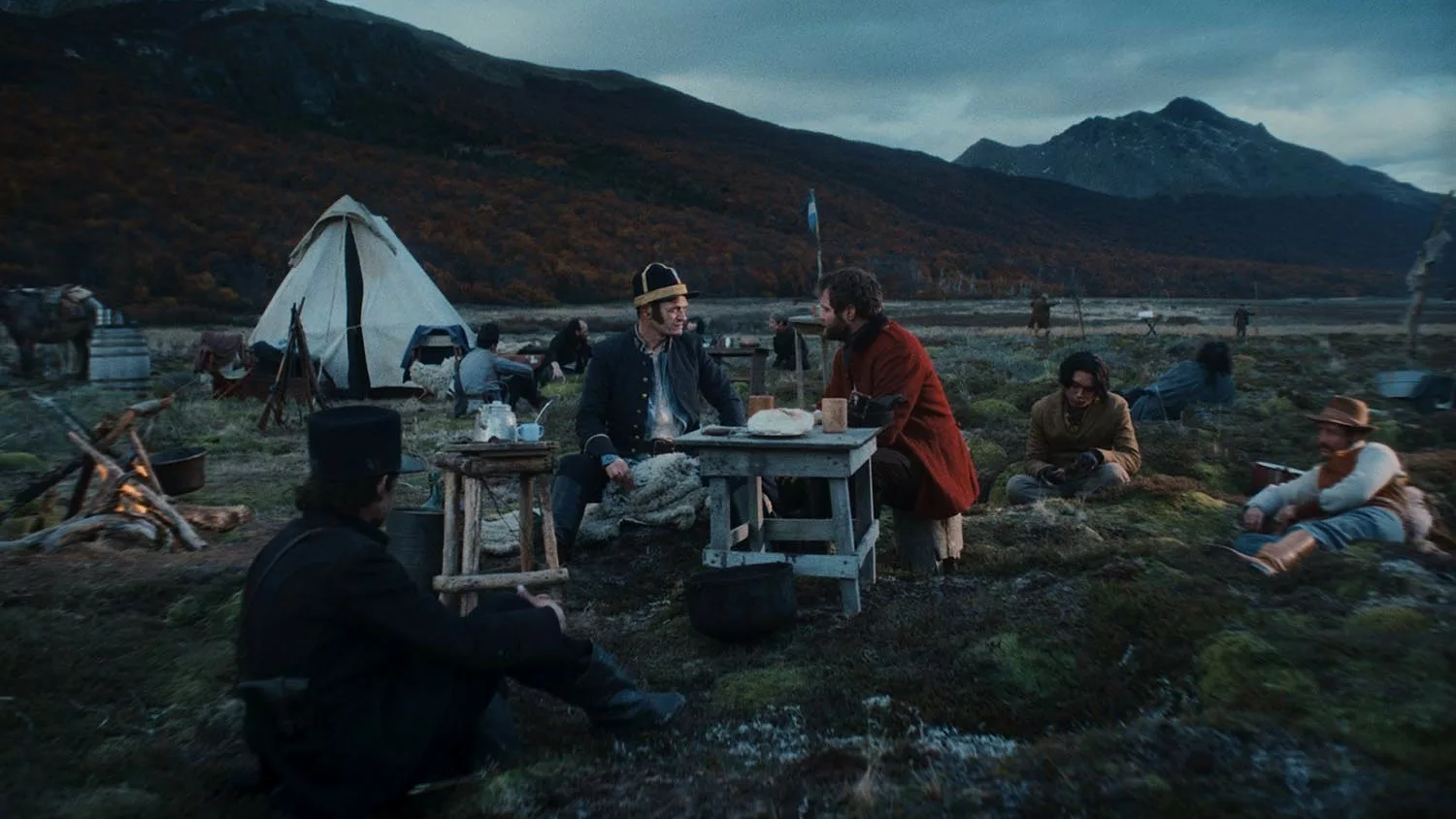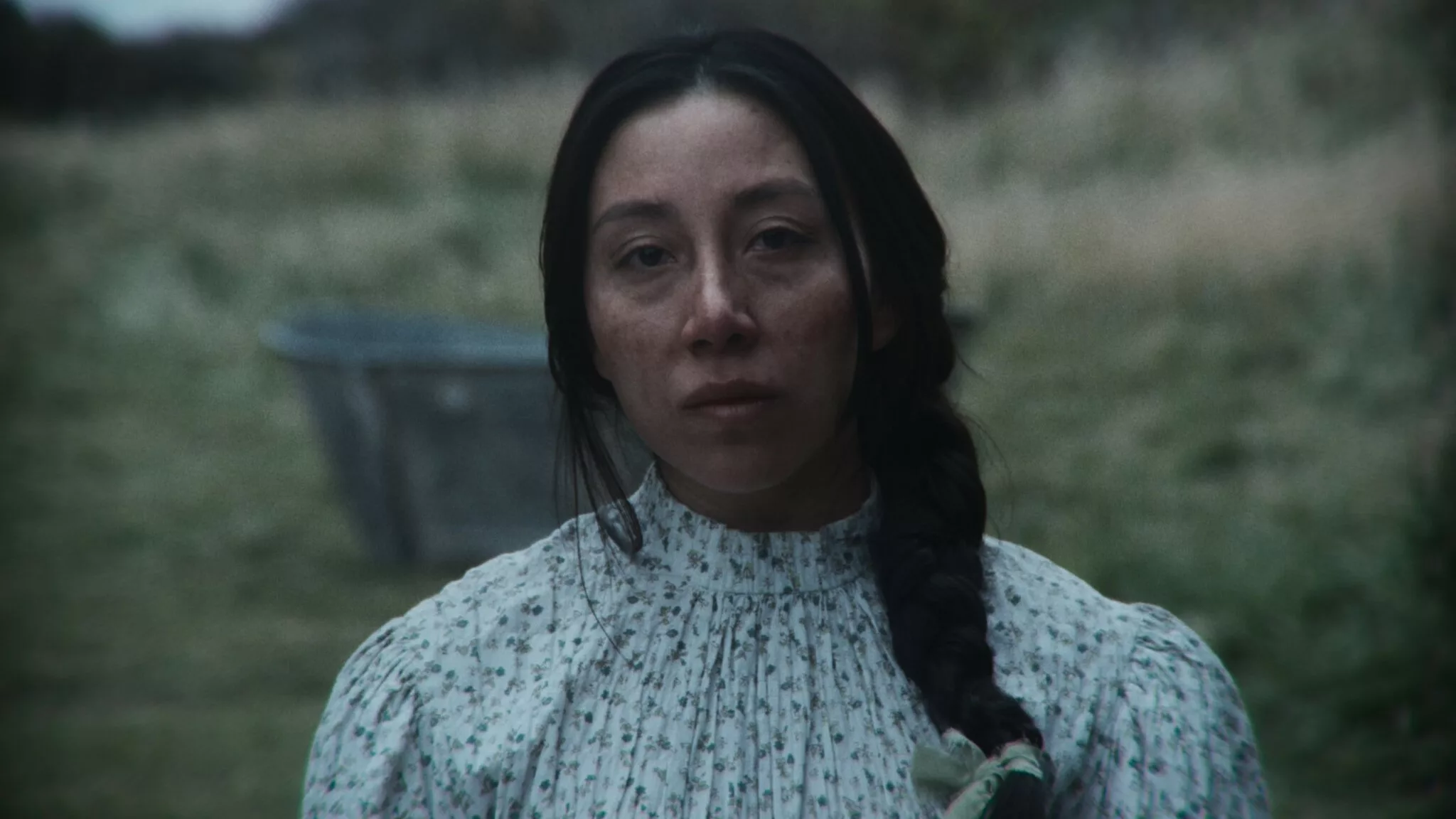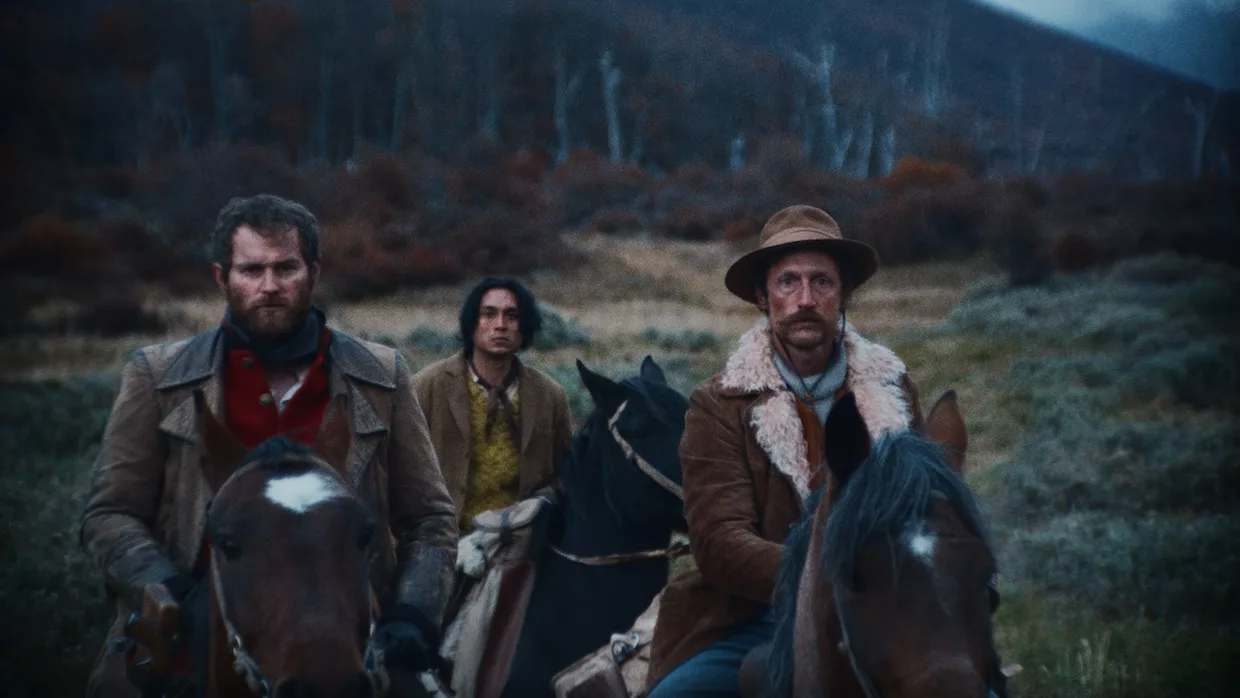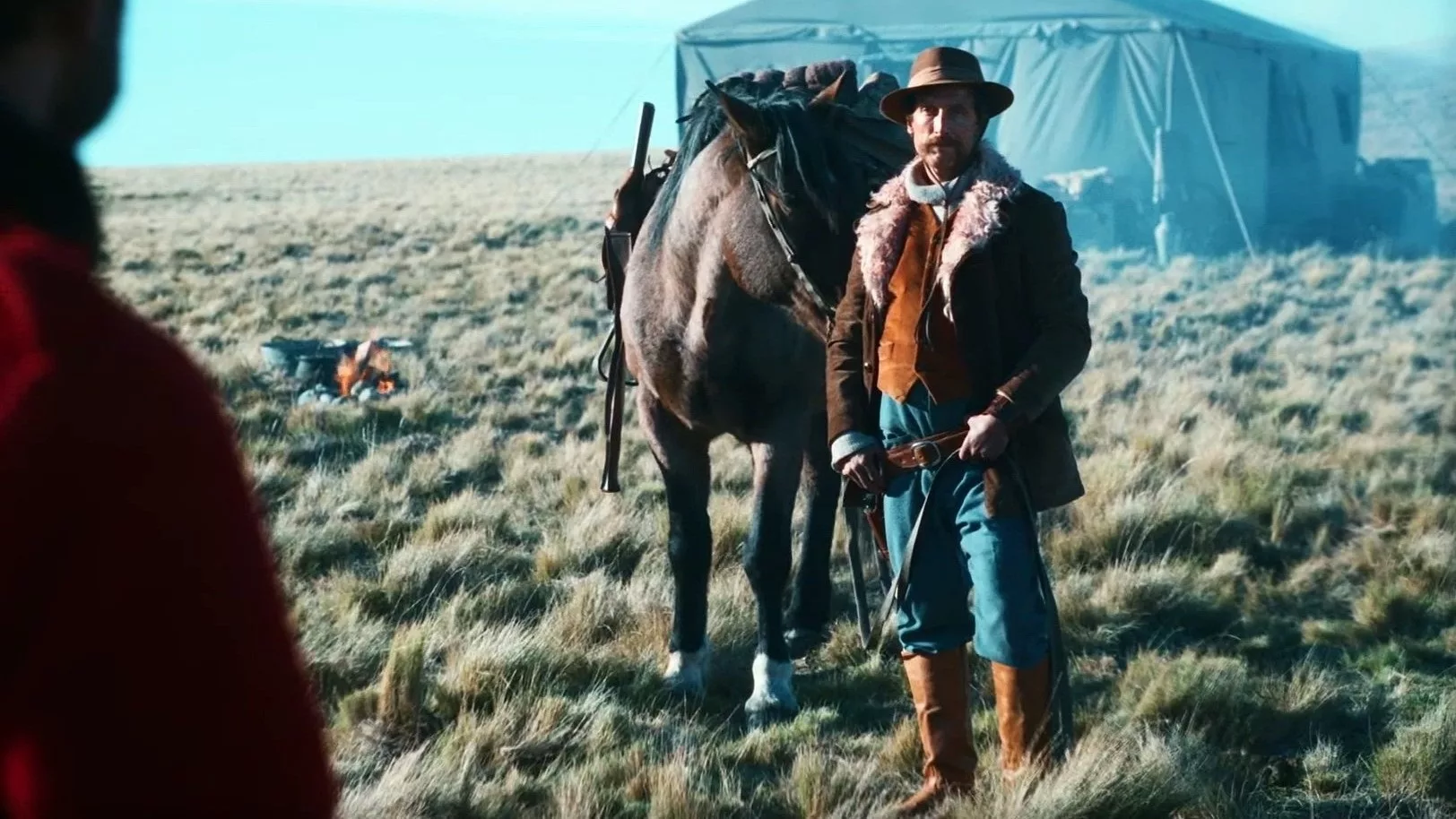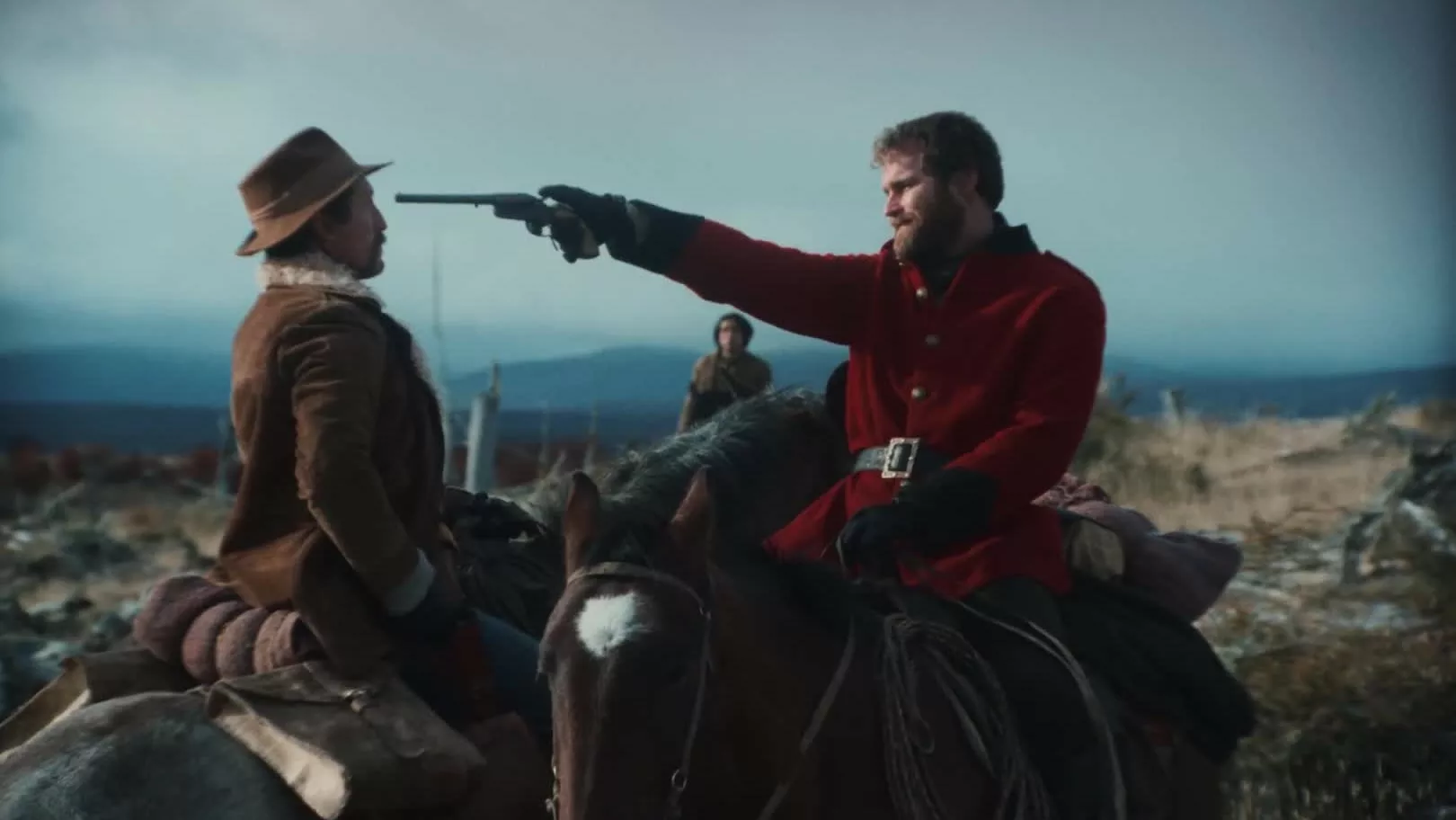Felipe Gálvez pulls no punches with his hard-hitting directorial debut, The Settlers. This unflinching film throws open the history books to shine a harsh light on Chile’s brutal origins, confronting the genocide of the Selk’nam people head-on. Don’t expect any Hollywood sheen here – this is an artful sledgehammer determined to expose colonialism’s bloody bedrock.
Set on Chile’s wild frontier in 1901, The Settlers tracks a trio of mercenaries led by a former British soldier, Alexander MacLennan (Mark Stanley). They’re on a mission to secure trade routes for wealthy landowner José Menéndez (Alfredo Castro), but it soon becomes clear there’s a more sinister objective at play. MacLennan and his cronies have been ordered to wipe out the native Selk’nam people, cleansing the land for their employer’s economic gain.
Joining the racist lieutenant on this ill-fated quest is hot-headed American cowboy Bill (Benjamin Westfall) and conflicted mestizo Segundo (Camilo Arancibia) – a mixed-race Chilean who finds himself stuck between two worlds. As Gálvez drives his characters deep into the Patagonian wilds, cinematographer Simone D’Arcangelo captures both the raw beauty and endless menace of this vast landscape. Haunting vistas loom large, dwarfing the explorers as Harry Allouche’s mournful score echoes like a dirge on the wind. The mood is both romantic and fearful, evoking classic Sergio Leone. But something far uglier lurks behind the next ridge…
Bloodstained Frontier
The Settlers swiftly establishes a lawless frontier vibe, as we’re thrown into the wilds of 1901 Chile. This is Tierra del Fuego – pretty name, ugly history. An outpost on the edge of the known world, where the depleted ranks of colonial conquerors wage war on both the land and its people.
We open on the ruthless dispatch of an injured ranch worker, hinting at worse to come. This is the domain of wealthy land baron José Menéndez, a speculator carving his name into Patagonia’s fertile grasslands – whether the native Selk’nam people like it or not. And they most definitely do not.
Menéndez tasks Scottish loyalist Lt. Alexander MacLennan with leading a surveying expedition to map safe trade routes through the region, hoping to transport profitable livestock back east. But the lieutenant’s also given a covert brief: slaughter any Selk’nam who might slow this progress.
Joining the unhinged redcoat on his genocidal quest is a ragtag band of European migrants, equally complicit in this imperialist expansion. There’s Bill – a leathery Texan cowboy who whiles away the long rides boasting of his glory days massacring Native Americans back home. And Segundo, a conflicted mestizo scout forced to lead these brutal interlopers through his ancestral lands, lest he becomes their next victim.
As MacLennan’s party traverse glacier passes and frozen forests, they find the landscape strangely empty. But not for long. Smoke signals the presence of a Selk’nam encampment nearby – the last thriving tribal community in these parts. Bill grins wickedly in anticipation of the bloodletting ahead. Even worldly-wise Segundo seems unable to divert the forthcoming slaughter…
Later scenes fast-forward, as Chilean officials belatedly investigate those grisly frontier purges for a whitewashed history report. But the lone survivor they interview – a haunted, aging Segundo – proves too raw a first-hand account for such diplomatic revisionism. Some truths refuse to be buried, no matter the political cost.
Deconstructing the Western Myth
On the surface, The Settlers sticks closely to the conventions of a revisionist western. We’ve got mysterious loners exploring a harsh frontier, violently colliding with ‘savage’ natives. There are sweat-drenched standoffs and blazing guns set against brooding desert vistas straight from a John Ford epic. Yet co-writers Felipe Gálvez and Antonia Girardi subtly undermine these well-worn genre tropes, confronting romantic myths of manifest destiny.
Cinematographer Simone D’Arcangelo lenses the sublime Chilean landscape in the boxy 4:3 Academy ratio, evoking the passage of time. These are historical tales playing out across spaces where the ghosts of colonialism still linger. Hints of modernity feel jarringly anachronistic against Simón Ibarra’s detailed period production design, almost questioning the reliability of our perspective.
As the central trio of wanderers venture beyond civilization’s grasp, the absence of dialogue takes on a poetic quality. Vast landscapes dwarf these arrogant white interlopers, undermining their supremacy. Stripped of words in the face of nature’s grandeur, notions of racial superiority ring hollow.
Among this motley band, the outsider perspective gradually shifts to Segundo – our quietly defiant mestizo guide caught between worlds. While the bickering Europeans trade pantomime machismo, Segundo witnesses the full horror of their actions with wordless detachment. As the mission descends into genocidal mania, Segundo becomes both accomplice and witness – a painful embodiment of Chile’s own divided origins.
By experiencing events through Segundo’s alienated gaze, The Settlers foregrounds the lasting trauma inflicted when one ethnic group dominates another by force. Segundo is the lone wanderer who returns with scars no western fantasy can romanticize. His truth resists censorship even decades later, bursting through polite historical revisionism.
Some critics argue The Settlers’ adherence to genre tropes undermines its high-minded critiques, while others highlight its unique postcolonial perspective. Yet there’s no doubting Felipe Gálvez announces himself as a bold new voice, laying Chile’s foundation myths bare amongst the bones of forgotten people. This is a nation’s dark past dragged into the unforgiving light, where even the reliable comforts of movie genres lose their power to deceive.
Delving into The Settlers’ Complex Figures
The Settlers thrives on complexity, with no clear-cut heroes or villains. Felipe Gálvez populates his Chilean psychodrama with contradictory souls wrestling personal demons against the sweeping backdrop of Patagonia’s pitiless frontier. Let’s analyze key players in this blood-flecked colonization puzzle.
Alexander MacLennan makes for a suitably despicable figurehead. Mark Stanley imbues the Scottish loyalist with delusions of nobility that mask his truly odious nature. Stripped of regimented army hierarchies in the lawless pampas, base urges take control as MacLennan devolves into feral barbarism. His addiction to violence leaves local tribes facing complete extermination. Yet glimpses of MacLennan’s past suggest a traumatized man clinging to redundant power structures in a vain quest for lost purpose and self-worth.
The Texan tracker Bill offers no such redemptive nuance – he’s avarice with a shooter on each hip. Benjamin Westfall plays the cowboy as Hollywood caricature, blasting myths of white supremacy across the plains. But as with all frontier folklore, it’s built on lies…and Bill’s cocksure colonial swagger shrinks from unseen terrors lurking in the night.
Most complex is Segundo – the mestizo guide torn between loyalties. Camilo Arancibia gifts the conflicted scout an existential weariness no dialogue could convey. Oppressed by the very countrymen supposed to offer fellowship, Segundo dreams of escape. Yet duty and necessity bind him to these Europeans as they pursue twin goals of profit and genocide. Through the pain in Arancibia’s eyes, we glimpse the psychic split of a nation struggling to reconcile its own origins.
Even secondary characters refuse easy judgement. When a rival band of aristocratic sadists arrives, we initially assume greater villainy. But the Iranian British psycho Colonel Martin also displays unexpected sympathy for Segundo amidst racist pontifications. And investigator Vicuña seems a heroic justice-bringer…until his toothless truth commissions falter before Chilean corruption at the highest levels. All prove morally compromised in some form – much like the nation itself.
The Ugly Truth
It’s clear Felipe Gálvez has studied the history books – as well as the films of Sergio Leone and Cormac McCarthy. The Settlers channels the low-key power of classic revisionist westerns, while remaining unafraid to show colonization’s shocking brutality. Some unusual creative choices frustrate, but when this bleak odyssey clicks, it packs a visually spectacular punch.
Cinematographer Simone D’Arcangelo produces towering panoramic framings straight from a John Ford travelogue. Chile’s far-flung landscapes possess an alien beauty, even as human ugliness mars their purity. Floating steadicam glides through fog-shrouded forests with Malick-esque reverence, reminding us that nature endures even humanity’s worst crimes. These visuals linger long after names and deeds fade into obscurity.
At times, Felipe Gálvez leans too eagerly into self-conscious genre play, with on-the-nose chapter headings and an anachronistic Morricone-esque score announcing each new narrative ‘twist’ a little loudly. But amidst the shallow pastiche are moments of emotional insight – particularly Camilo Arancibia’s haunting performance as the outsider Segundo. His wordless anguish following the brutal massacre scene conveys a universal trauma no genre conventions can contain.
Some critics argue The Settlers’ adherence to familiar western tropes undermines its postcolonial commentary. Others highlight its unique perspective – experiencing historical horrors through the eyes of an oppressed survivor. Segundo becomes both agent and prisoner, forced to renounce his identity to ease the frontier’s transition from indigenous autonomy to authoritarian control. It’s a tension that Chile itself still struggles to resolve.
The closing’s overriding mood is disillusioned fury at official histories sanitizing Segundo’s suffering to salvage national pride. As an elderly official gently probes the aging mestizo for innocuous public testimony, his raw first-hand account resists simple reconciliation – both personal and political. This scholarly interrogator seems destined to bury ugly first-hand truths. Some stains simply cannot be expunged from the land or ledger.
The Settlers – Contender or Pretender for Oscar Gold?
With Chile submitting The Settlers for 2023 Academy Award consideration, Felipe Gálvez’s confronting debut now faces the ultimate critical test: Oscar credibility. Can this unflinching exploration of national origins court glory or mere controversy?
The Settlers arrives well-credentialed, with Best Film wins at both SANFIC and Guaraqueçaba festival de Cinema. Lead actor Camilo Arancibia also snagged Best Actor at both events – significant momentum that could propel The Settlers into the Oscars race.
The recent international breakout success of films like Peru’s Coche Bomba and Guatemala’s La Condesa de Cabarrús proves the expanded Best International Feature category now better encompasses Latin American cinema. This should boost The Settlers’ chances…if Academy voters can stomach such brazen historical indictment.
With Chilean environment-focused documentaries like The Magic Mountain and Immunology grabbing recent nominations, The Settlers aligns with Oscar’s growing appetite for Chile’s next-gen filmmakers rattling national cages. Similar confrontational efforts like Argentina’s 1985 and Colombia’s Memoria found awards success by dragging the past into uncomfortable contemporary glare.
Yet for all its festival pedigree, The Settlers must overcome significant headwinds en route to Academy glory. Firstly, many Oscar pundits critiqued Ciro Guerra’s Waiting for the Barbarians – another revisionist colonizer drama – for prioritizing style over substance despite a decorated cast. The Settlers could face similar critiques given its lean narrative amidst spectacular vistas.
Much depends on Chile’s ability to fund the savvy Oscar campaign such outsider success requires. Backing experimental debut films doesn’t come naturally to South America’s comparatively conservative funding bodies. But Chile submitted Gabriele Oparah’s equally shocking Domingo for last year’s International Feature race – so The Settlers likely signals deliberate continuation of that confrontational strategy.
If Arancibia becomes this class’ Diego Calva (of Babylon fame), his internalized agony could overcome any Oscar voter reluctance just as Colman Domingo overcame Initial hurdles for Zola. The possibility of landmark Chilean success through such transgressive genre subversion seems increasingly plausible as Academy tastes evolve. But it’s sure to split critical opinion.
Unflinching and Unforgettable
The Settlers pulls no punches in its searing exploration of Chile’s genocidal birth pangs. Stunning vistas can’t obscure the blood spilled to drive ‘progress’ in this unblinking chronicle of colonial conquest. Yet Felipe Gálvez resists polemics, wrapping raw atrocity within timeworn genre conventions – and one haunting performance.
By processing historical horrors through the gaze of Camilo Arancibia’s conflicted outsider Segundo, The Settlers finds startling contemporary resonance. Removed from its sparse Leone-esque trappings, this is a universal portrait of identities severed by shifting authoritarian regimes. From the violated landscapes to Segundo’s muted agony, the traumas of erasure and exclusion scar all before him.
While chilly style and postmodern touches sometimes distract, glimmers of humanity shine amongst the carnage once protagonists penetrate the sociopolitical veils of conquest. Stunning widescreen vistas place tiny tyrants under an indifferent cosmos, revealing the petty vanities driving ‘civilized’ torture and murder. Stripped of rhetorical disguises, the brutal treatment of supposedly ‘savage’ tribes nakedly exposes modernity’s own heart of darkness.
Some clunky closing exposition spells out themes already piercingly visualized, but the overall technique intrigues. Blending exploitation shock tactics with art-house opacity, The Settlers draws blood while keeping mainstream audiences unsettled. Felipe Gálvez may be a freshman filmmaker, but his uncompromising vision announces a bold new Chilean voice that demands Oscar attention. This powder-keg of slow-burning fury contains uncomfortable truths certain to ignite awards buzz.
In profoundly humanizing Chile’s horror-strewn history, The Settlers locates resonant contemporary outrage in landscapes seemingly untouched by time. Yet one piercing look from Segundo bridges epochs, channeling eternal censure against imperial powers claiming authority from above while treading innocents underfoot. Such stark primal agony doesn’t fade quietly from memory – or Academy shortlists.
The Review
The Settlers
Stark and uncompromising, The Settlers drags colonialism’s bloodied skeletons from tightly-sealed national closets, leaving both landscapes and consciences indelibly scarred. This haunting cry of outrage against racially-charged oppression resonates loudly for Chile and beyond. Felipe Gálvez has crafted a formidable debut. By returning again and again to Camilo Arancibia’s anguished outsider gaze, this Western exposé of Chile's genocidal original sin gains universal power. Segundo is every displaced indigenous soul robbed of identity so foreign powers can redraw borders with impunity. As the lone wanderer returns haunted by his people’s demise, so too must audiences carry such bold firsthand censure into wider waking worlds. This confronting film’s stats may prove too bleak for some, while genre traditionalists may balk at revisionism reframing frontier adventures as totalitarian tyranny. But Gálvez has announced himself as a defiant new voice impossible to ignore henceforth. The Settlers won’t just spark film festival bonfires - it promises enduring global conflagration. Mark this visionary’s name.
PROS
- Breathtaking cinematography and landscapes
- Haunting score sets ominous mood
- Powerful central performance by Arancibia
- Unflinching exploration of Chile's colonial genocide
- Strong visual storytelling and themes
- Unique revisionist Western perspective
- Ambitious structure with time jump
CONS
- Slow pacing early on
- Some gimmicky Western tropes
- Heavy-handed at times
- Abrupt tonal shifts
- Uneven blending of art-house and exploitation
